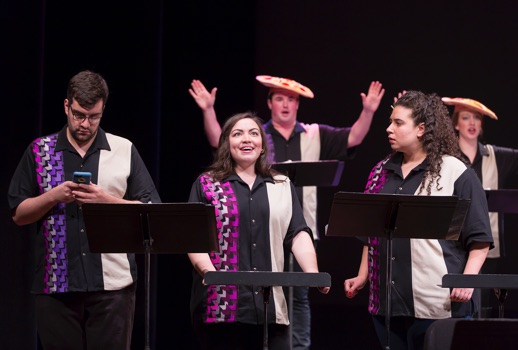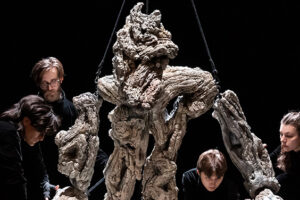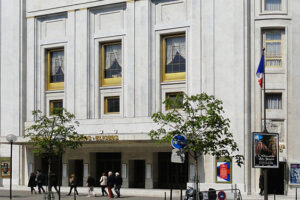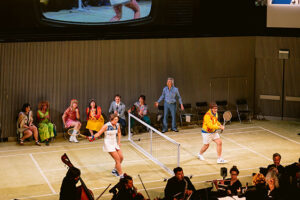

The setup: WNO commissions three composer/librettist teams to create short works of around 20 minutes, which are then workshopped with a few celebrity mentors (contemporary opera-wise) and presented by members of WNO’s Domingo-Cafritz Young Artist program and members of the WNO orchestra.
Twenty Minutes or Less, by composer Sarah Hutchings and librettist Mark Sonnenblick, starts as a playful romp in a pizzeria, drifting into a lonely character portrait in its second half. Hutchings’ versatile score imaginatively captured the tonal shifts, moving from spiky, rollicking ensembles to a series of introspective Bernstein-esque arias beautifully conveyed by Daryl Freedman’s expansive mezzo (she will sing Rossweisse in the Zambello Ring kicking off in the Spring).
David Clay Mettens and Joshua McGuire’s Alexandra, perhaps the most dramatically ambitious and musically challenging work of the evening, offered a meditation on loss revolving around three characters linked across time. Mettens’ fluid handling of the voices kept the somber libretto interesting, and the particularly distinctive writing for the title character’s monologues was a fine showcase for mezzo Leah Hawkins’ steely, robust sound.
Service Provider, by Christopher Weiss and John de los Santos, turned in a crowd-pleasing farce for the finale, replete with infidelity, laffs about bad cellphone etiquette, and a haughty waiter. Freedman had another opportunity to shine here, well-paired with the warm baritone of Hunter Enoch, seen earlier this year in as Morales in WNO’s Carmen. Another Carmen alum, Rexford Tester, gamely took on the florid writing for the waiter character.
Comic subjects are a natural bet for the mini-opera format imposed here, and the usual questions apply: 1) would we rather just be watching musical theatre, and 2) how many of the “jokes” are just actors singing about pedestrian stuff in their opera voices? If the libretti of Twenty Minutes and Service Provider didn’t always succeed on these counts, one’s interest rarely flagged.
A related navel-gazing question one might ask is, why do so many new opera libretti forgo the kind of experimentation commonplace in contemporary theatre for stodgy cinematic literalism? Of the three works here, Alexandra was the most adventurous on this count, but it would be great to see more writers using this platform to really explore the possibilities of the form.
Musically, one was struck by how these polished scores managed to keep the action moving with dramatically exciting music that shares some common DNA (in a good way) with today’s highbrow Broadway scores, without sacrificing richer musical interest. John DeMain and the WNO Orchestra members supported the singers with persuasive readings; Andrea Dorf McGray presided over a clean and effective concert staging.
Photo by Scott Suchman for WNO.
























Comments